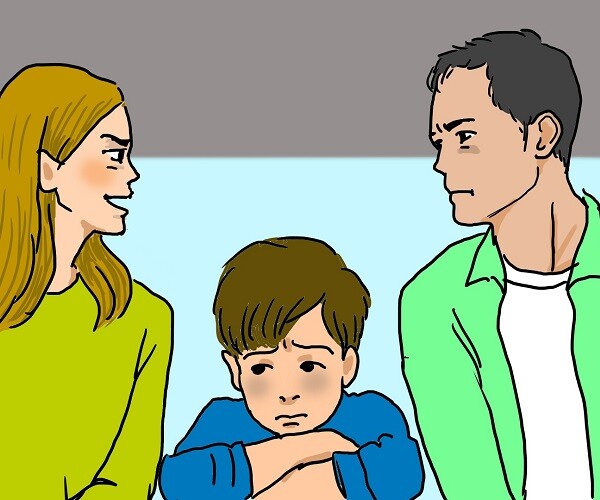Unbeknownst to parents, some unconscious phrases can inadvertently create a sense of guilt in children, leading them to blame themselves and think that if they didn’t exist, things would be better. This can cause long-term psychological issues such as depression or anxiety.
For example, the phrase, “If it weren’t for you, your parents would have divorced a long time ago”, can make children feel guilty and ashamed, leading to difficulties in forming healthy relationships in the future.

Illustration.
When children are not taught how to deal with emotions and conflicts positively, they may struggle to resolve life’s disputes. Therefore, parents should strive for more positive communication. Instead of blaming their children, they should share marital difficulties unrelated to them.
Recognizing and changing family communication is crucial. Parents must understand that children are not the cause of marital problems and should create a safe, loving environment for their psychological and emotional development.
On this matter, psychologist Quang Thi Mong Chi provides deeper insights and suggests more effective communication methods between parents and children.

Psychologist Quang Thi Mong Chi.

Can children feel that they are the reason their parents cannot divorce? If so, how does this affect their psychology?
When parents say, “If it weren’t for you, we would have divorced a long time ago”, children may feel they are the reason their parents cannot divorce. This can lead to several negative psychological impacts. Firstly, children may carry a sense of guilt and heavy responsibility, always thinking they are a burden, causing their parents to endure an unhappy marriage.
This can create invisible pressure, leading children to strive to please their parents and live in fear that if they misbehave, their parents will indeed separate. Moreover, children may also feel insecure and constantly fearful that their family will fall apart at any moment. Witnessing constant conflicts between parents can make children sensitive and lose their sense of security.
Furthermore, the thought that their parents are together only because of them may cause children to feel their self-worth diminish, and doubt whether their parents’ love is genuine. As they grow up, they may struggle to form personal relationships and easily develop negative thoughts about marriage or fall into a state of endurance in unhealthy relationships.
In addition to psychological impacts, stress and anxiety can also affect children’s academic performance and daily life. They may become inattentive, irritable, or withdrawn and, in some cases, rebellious in response to family instability.
To minimize these negative impacts, parents should reassure their children that their love is unconditional and that they should not feel they are the reason for maintaining their parents’ marriage. Instead of emphasizing endurance, parents should create a stable family environment where children can share their emotions and feel safe. If children show signs of severe psychological distress, seeking help from a psychologist is essential.

How might this phrase influence children’s perspectives on love and marriage? What misconceptions might they form about future relationships?
The phrase, “If it weren’t for you, we would have divorced a long time ago”, also profoundly affects children’s perspectives on love and marriage, leading to misconceptions about future relationships. Growing up in a family where parents maintain their marriage, not out of love but duty or obligation, can cause children to develop negative perceptions of relationships.
Firstly, children may believe that marriage is about endurance, not love and happiness. They may think that spouses must stay together despite a lack of romantic feelings, leading to accepting unhealthy relationships instead of seeking genuine happiness.
This can cause children, as they mature, to become trapped in unhappy marriages, fearing that leaving would mean failure. Secondly, children may form the view that children are a burden in marriage. Hearing their parents say they are together only because of them may make children feel their existence is a pressure rather than a joy.
This may influence their decision to start a family later, making them afraid to have children for fear of being bound to an unwanted relationship. Additionally, children may also develop the belief that love does not last, and all relationships will eventually reach a stalemate. This skepticism can make them cautious about committing, struggling to trust their partners, or even avoiding serious relationships.
On the other hand, some children may form the extreme view that marriage is meaningless and not worth pursuing. If children constantly witness tension, arguments, and unhappiness between their parents, they may conclude that marriage only brings suffering and constraints, leading them to avoid marriage as adults.

Can you share a similar case from your counseling experience? And how should children overcome such situations?
A similar case I encountered involved a 15-year-old boy living in a family where his parents frequently argued. Whenever they disagreed, they would tell him: “If it weren’t for you, we would have divorced a long time ago.” Hearing these words repeatedly, he began to feel like a burden and the reason his parents continued in an unhappy marriage.
He became quiet and withdrawn, no longer wanting to share his emotions with anyone. He felt responsible for maintaining peace in the family and always tried to please his parents, even at the cost of his well-being. Gradually, he lost focus in his studies, felt anxious, and even showed mild signs of depression. His social relationships and friendships diminished, and he no longer wanted to participate in school activities, preferring isolation and excessive phone use.
By the time he was in 9th grade, he had no friends, poor academic performance, no future plans, and low self-esteem and trust in others. To overcome the negative impacts of his parents’ words, children must realize they are not the cause of the problem. The difficulties in their parents’ marriage are the adults’ responsibility and not their fault.
Their parents’ decision to stay together or not should not become a psychological burden for them. Additionally, children need to express their emotions to relieve pressure by sharing with a trusted person, such as a teacher, sibling, or close friend. If they are reluctant to speak directly, they can keep a journal or engage in artistic activities like drawing, writing, or music to express their emotions gently.
Another crucial step is for children to have honest conversations with their parents about the hurt they are experiencing. If they cannot express themselves directly, they can write a letter or ask a trusted relative to convey their feelings.
Furthermore, children should focus on their lives and not get entangled in their parents’ conflicts. They can participate in sports, clubs, or volunteer work to build a positive environment for themselves. Developing hobbies and passions can also provide children with motivation and joy in life. If psychological pressures become overwhelming or they exhibit signs of depression or anxiety, seeking help from a psychological counselor is essential.
Help children understand their emotions and guide them to face the situation healthily. Most importantly, children need to know that their parents’ happiness is not their responsibility. They deserve a joyful and peaceful life, free from the burdens of adult problems.

What can parents do to avoid using such phrases and instead communicate positively?
To avoid using phrases that may harm their children psychologically, parents should adopt more positive communication methods. Firstly, they must refrain from blaming their children for marital problems. Conflicts between spouses are the adults’ responsibility, and children should not feel responsible for their family’s stability or breakdown.
Instead of the aforementioned phrase, parents should say, “We are facing some difficulties, but it has nothing to do with you. No matter what, we will always love you.” This reassures children of their parents’ love and removes the pressure of bearing adult issues.
Additionally, parents need to communicate honestly but appropriately for their children’s age. While children have a right to know about family matters, they should not be made to feel anxious or burdened. Phrases like, “We’re only enduring this for you” can make children feel guilty. Instead, parents should assert, “No matter what happens between us, you are still the most important thing in our lives.”
Conveying stability and love is also vital. Children need to know that, despite their parents’ conflicts, their love for them is unconditional. Saying, “We’re only together because of you” may make children feel bound, so parents should replace it with, “Our family may face challenges, but we will always face them together. You don’t have to worry about anything.”
Moreover, parents should avoid arguing in front of their children to prevent them from feeling caught between their parents or forced to take sides. If children inadvertently witness a dispute, parents should quickly reassure them that it is not their fault or concern.
Creating a safe environment for children to share their emotions is also crucial. When children feel anxious or sad, parents can say, “We know you may be feeling sad or worried. You can talk to us anytime.” This lets children know they are heard and supported.
Finally, if parents struggle to control their emotions when communicating with their children or if the family is going through a prolonged stressful period, seeking help from a family counselor can be beneficial.
A healthy family environment benefits not only the parents but also the children’s psychological and emotional development. By changing their communication style, parents can make their children feel safer and teach them positive values about love and family for their future.
The Magic Formula: 4 Steps to Help Parents and Children Excel
It is widely acknowledged that a child’s upbringing is heavily influenced by their parents’ emotional state and overall mindset. Experts in the field of child development strongly advocate for parents to prioritize their own emotional well-being and cultivate a positive outlook, as a foundational step towards effective parenting.







































